In the News–Reputation Management
The Ghosn Brand Is Broken. These Spin Doctors Say How to Fix It
David Heller, Corinne Gretler and Jeff Green, Bloomberg, January 12, 2020
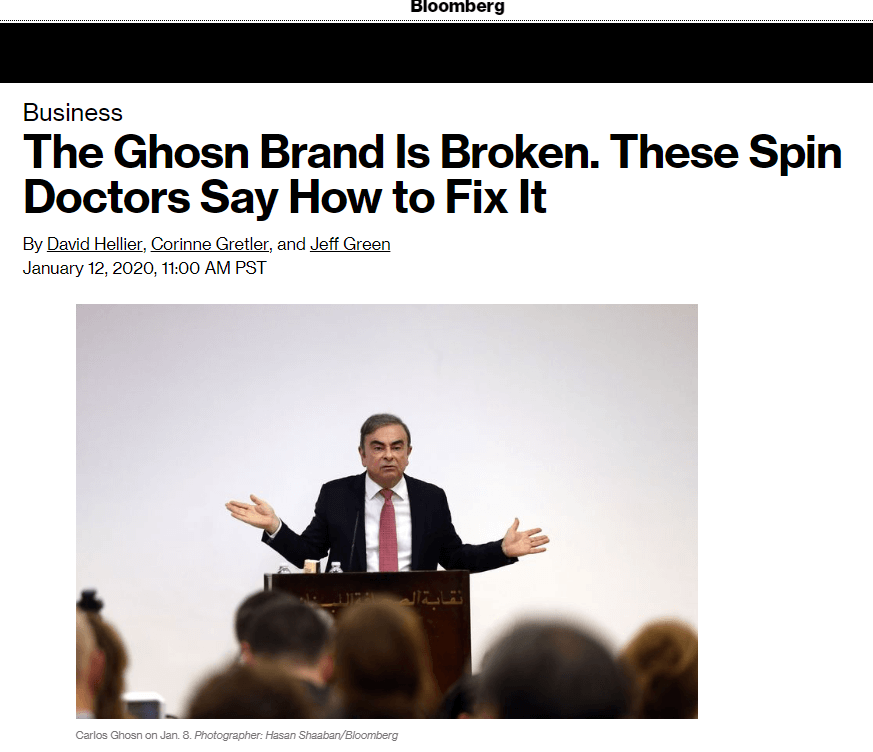
Carlos Ghosn captured the world’s attention by being spirited out of Japan in a private jet concealed in a box often used for audio equipment with the help of a security detail led by a former Green Beret. He evaded two trials on charges of financial misconduct. Now he wants to salvage his shattered reputation.
“The world does love an anti-hero,” said Davia Temin. “The world does love someone who bucks rules and regulations — if they’re a romantic figure. He has made himself into quite a romantic figure. As tempting as is it to tell his story, more and more, the risk now isn’t just that he will sour public support, but that he will do something to make himself a further target.” […read more]
Old Board Structures ‘Won’t Work Tomorrow’
Stephanie Forshee, Agenda, December 20, 2019

Agenda’s survey showed that audit committee directors have been tasked with taking the lead on cyber risks, at least according to 23.8% of survey respondents. And almost 36% of respondents feel that substantiated whistle-blower claims belong with the audit committee. Even though sexual misconduct allegations have been high-risk areas for legal recourse from shareholders, the committee of choice isn’t always with audit- or risk-focused directors.
According to the quarterly survey, 42.7% of respondents said that MeToo issues don’t belong to an individual committee but rather the full board. By contrast, 12.2% felt that MeToo issues don’t even belong in the boardroom to begin with.
But then there are the 18% who think the comp committee should be in charge of Me Too issues. Corporate governance professionals think that as an offshoot of human capital issues, cultural concerns have increasingly been landing with the comp committee.
Davia Temin, president and CEO of Temin & Co., says that in her experience with boards, the audit and risk committee members are typically the directors who primarily oversee sexual misconduct allegations, or sometimes the complaints will go to the executive committee. “A fair amount of time, those committees will inform the whole board if the issue is important enough,” Temin explains.
Temin notes that the push for boards to handle concerns of sexual harassment or misconduct is happening more frequently and is largely being driven by boards that have more women on them. “Often we find that it is women corporate directors who will champion MeToo issues being examined at the board level,” Temin says.
As for comp committees’ overseeing sexual misconduct claims, Temin thinks that responsibility should lie elsewhere, since executives subject to misconduct allegations aren’t just having their pay docked but are often being ousted from the companies if they are found guilty. “Comp committees historically have handled the issue when penalties have not included letting executives go, but instead included the forfeiture or clawback of compensation as a penalty for sexual harassment. Today, we know that this remedy is not seen to be as viable under public scrutiny as it once was. Thus, stronger measures are usually taken.”
The bottom line, in Temin’s opinion, is that “what worked yesterday no longer works today, and most assuredly will not work tomorrow.” […read more] (subscription required)
Harvey Weinstein Sex Abuse Settlement Is Not an ‘Oh, Wow’ Number
Jeff Green, Bloomberg, December 11, 2019
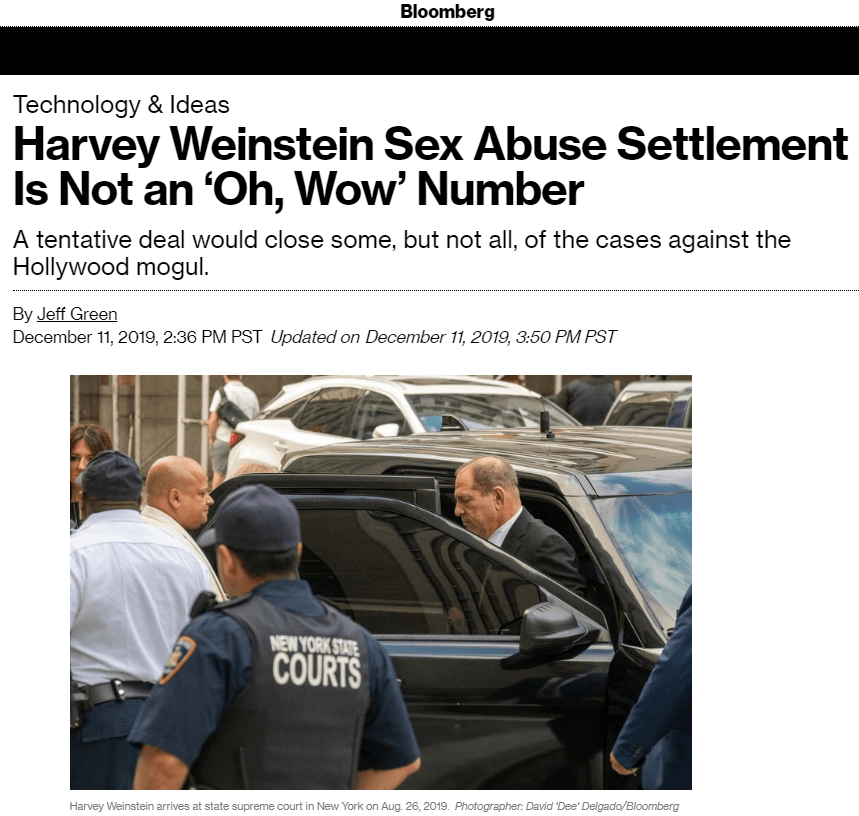
A tentative $47 million settlement between Harvey Weinstein and dozens of his accusers is “flawed,” advocates say, but still an important vindication.
“I think it’s just on the margin of being seen as serious, but it certainly does not deliver the message that $100 million would deliver, or $200 million would deliver,” said Davia Temin, founder of crisis consultancy Temin and Company, which has tracked more than 1,400 people accused of harassment and other misbehavior since the Weinstein allegations surfaced. “This isn’t some ‘oh, wow’ number.”
Considering the scope of the allegations and their impact, Temin and others expected a higher figure. […read more]
Want to Date a Colleague? Think Carefully
Vanessa Fuhrmans and Rachel Feintzeig, The Wall Street Journal, December 5, 2019
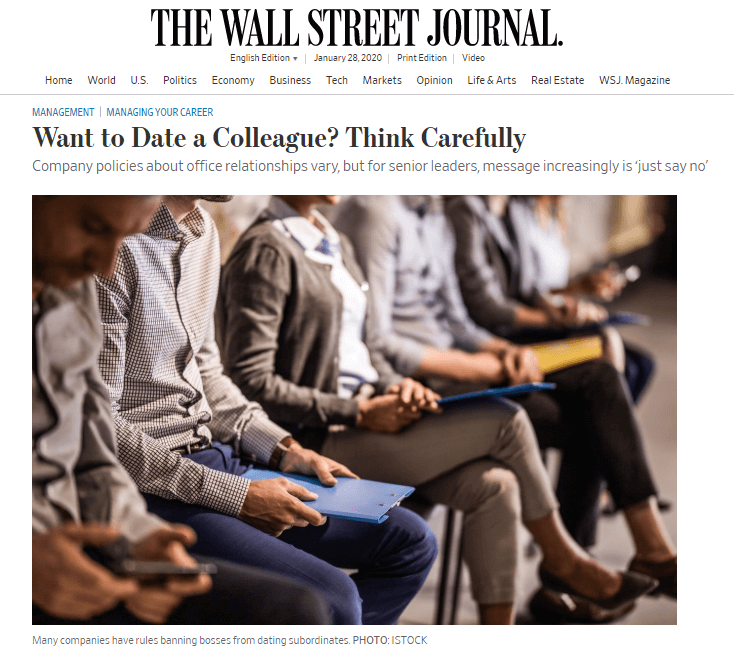
Companies have increased scrutiny of consensual relationships among colleagues in the wake of the #MeToo movement. Whatever the corporate dating policy is, the underlying message to senior executives is: Just don’t do it. Mark Wiseman, a potential successor to BlackRock Inc. Chief Executive Laurence Fink, became the latest high-level boss to run afoul of company rules on romantic relationships at work.
Increasingly, organizations are hoping relationships just don’t crop up in their offices at all, said Davia Temin, CEO of Temin and Company, a Manhattan-based reputation and crisis-management firm. Whether it is a direct message or one read between the lines, “some places are saying, ‘Just say no,'” she said.
Some companies have had longstanding policies around relationships at work, but they often weren’t well-enforced rules. That is changing. Avoiding mixing love and work is the safer choice today, Ms. Temin said. […read more]
McDonald’s wins praise for firing its CEO but reignites scrutiny over worker complaints
Amelia Lucas, CNBC, November 06, 2019
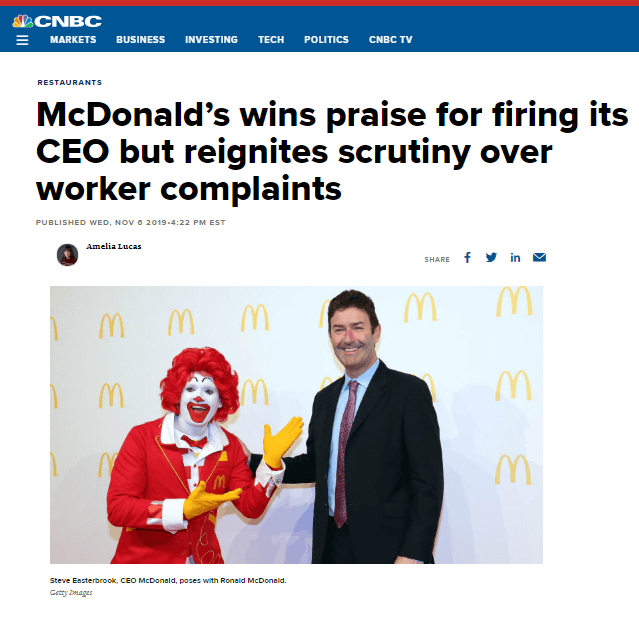
McDonald’s is garnering praise after deciding to fire its chief executive for having a relationship with an employee.
But the decision is reigniting scrutiny of the company’s handling of sexual harassment incidents that involve restaurant workers.
The Chicago-based company announced on Sunday that its board ousted CEO Steve Easterbrook for having a consensual relationship with an employee, a violation of the company’s non-fraternization policy.
“These days, what we find is boards are more worried about reputational risk, and they’re taking more action and acting more promptly,” said Davia Temin, the CEO of management consultancy Temin and Company. […read more]
Wayfair Employees Protest in Boston Over Border Camp Sales
Sammy Criscitello, Janet Wu and Jordyn Holman, Bloomberg, June 26, 2019
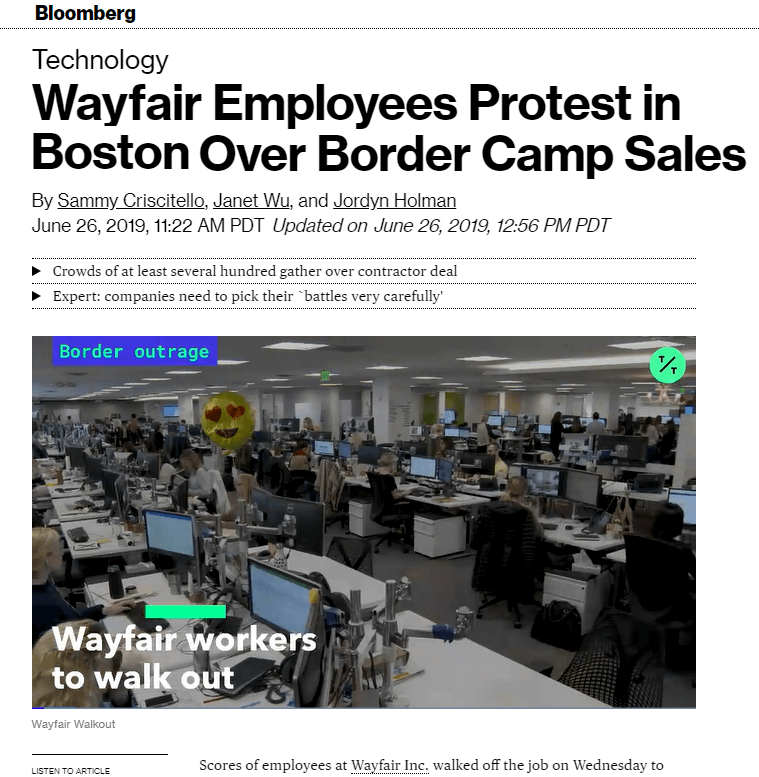
Scores of employees at Wayfair Inc. walked off the job on Wednesday to protest the online retailer’s sale of beds to contractors furnishing border camps for asylum seekers.
Wayfair is just the latest company to face intense public scrutiny from its employee base over political issues, according to Davia Temin, head of the New York-based crisis-management firm Temin & Co.
“Once you are in that spotlight, it will have an impact,” Temin said ahead of the protest. “It puts them on the wrong side of their customer base who are generally young and probably a little bit more activist.” […read more]
Sexual harassment allegations are down sharply since Harvey Weinstein first accused
Megan Cerullo, CBS News, June 19, 2019
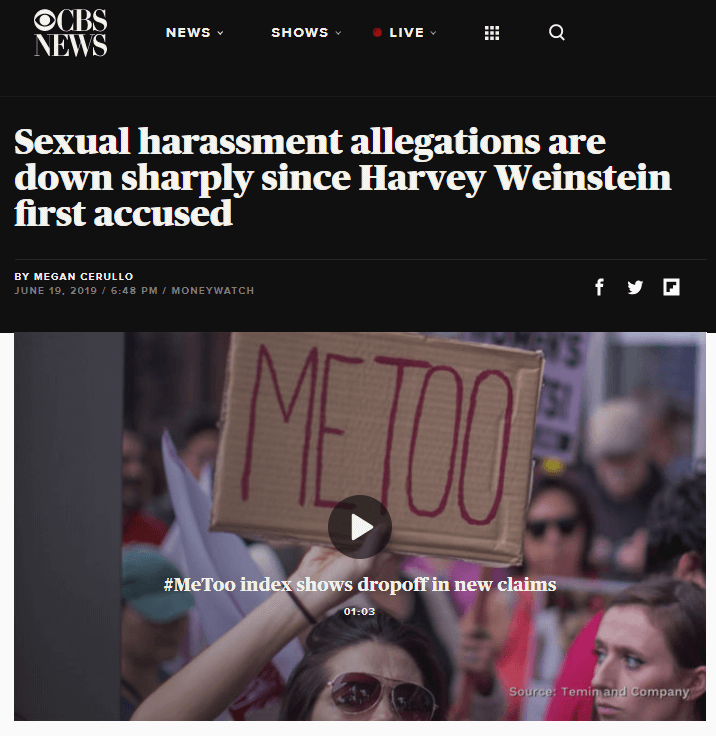
Good news, perhaps, for victims of harassment in the workplace. The number of highly publicized #MeToo accusations dropped to the lowest level last month since peaking in October 2017, when former Hollywood studio chief Harvey Weinstein was first accused of sexual harassment. That’s according to the “#MeToo Index,” which tracks what it calls “high-profile” accusations of sexual misconduct in entertainment, media, politics and other employment sectors.
Twelve such accusations surfaced in May, down from 143 in October 2017, according to Temin and Company, a corporate reputation management and public relations firm that maintains the #MeToo Index. Temin attributes the steep drop in public accusations to a combination of factors, including companies’ improved internal reporting systems and procedures for handling complaints.
“Organizations have become more savvy, so when they hear complaints they are quicker to investigate, address and handle them in some way, as opposed to ignore them,” Davia Temin, the firm’s CEO, said. […read more]
‘A new era’: Trump and 2020 hopefuls are singling out more American companies by name
Jena McGregor, The Washington Post, June 13, 2019
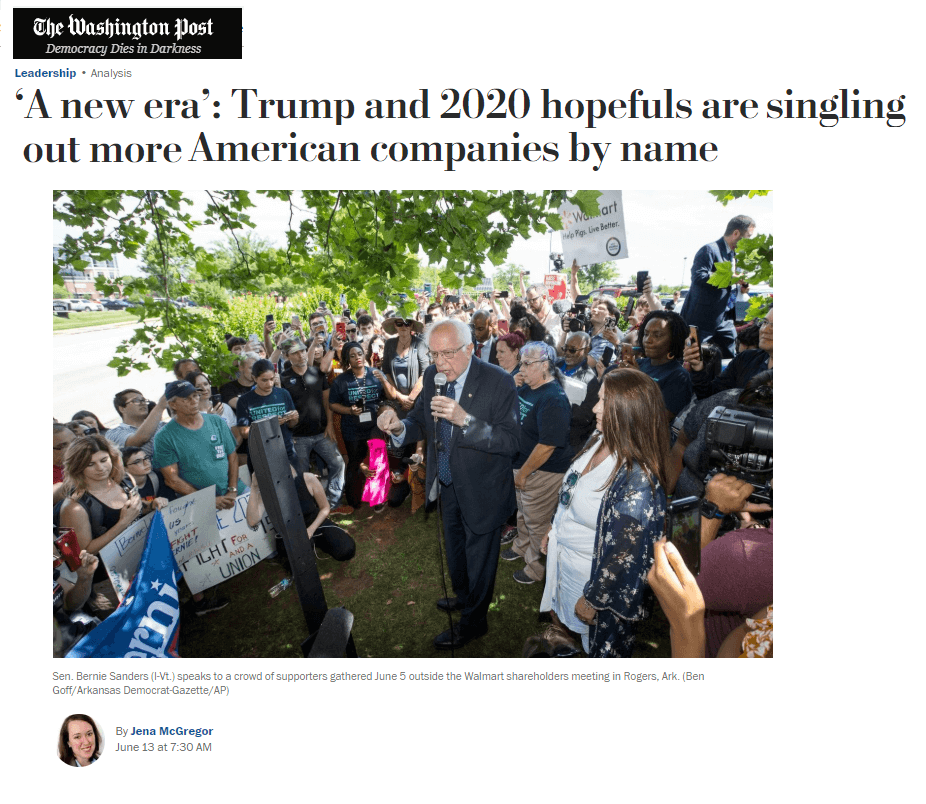
On Monday, after Raytheon and United Technologies announced merger plans, President Trump weighed in again with an opinion about American corporate business decisions, telling CNBC he was “a little concerned” the defense contractor and industrial technology giant’s merger could result in less competition if they become “one big fat beautiful company.” It was the latest in a long string of examples of Trump — whether by tweet or by tirade — singling out American companies.
But the president has been joined more often in recent months by 2020 Democratic presidential candidates who are also increasingly calling out companies by name, directly challenging American businesses in a way that historians and communication experts say underscores a new era.
Communications experts advised companies not to get into Twitter wars, to be responsive but not respond in kind, and to prioritize connecting with White House or legislative staffers early on when making announcements that could come under fire. In most cases, companies should use the opportunity to explain their story or strategy again rather than fight.
“Don’t escalate, don’t shoot back,” said Davia Temin, a communications and management coach on reputation issues. “The last thing an awful lot of people want is a one-upmanship match between the president or presidential candidates and an individual company.” […read more]
The Doyenne of ‘Courage’ in Crisis
Bridget Paverd, PRSA, May 13, 2019

I spent a morning in New York City with Davia Temin last week.
While respectful of the knowledge of others, and always open to learning, there are just so many accomplished professionals that I am seldom blown away meeting a specialized superstar.
Davia is an exception.
Davia and I discussed crisis as we see it now, in 2019…. A world of ‘alternative facts’ and the MeToo movement. We shared war stories. I wanted to write down every word she said – she was so generous with advice. We talked about the value of the truth. And of listening. Of “hearing” both clients and audiences and moving our clients into recovery as quickly as possible.
Davia Temin has shaped, and continues to define, contemporary crisis communication. All of us who work in reputation management have been influenced by her leadership. Even those who don’t know her name follow her best practices. Barely a month goes by that she is not quoted in major media. […read more]
Marketing Lessons From Chase Bank’s Twitter Blowup
Bill Streeter, The Financial Brand, May 9, 2019
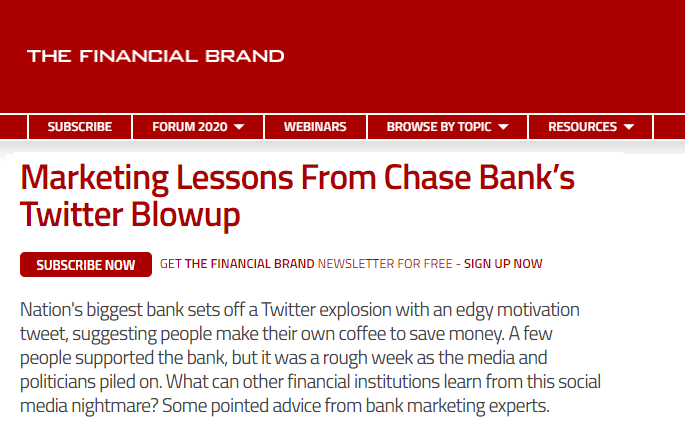
Nation’s biggest bank sets off a Twitter explosion with an edgy motivation tweet, suggesting people make their own coffee to save money. A few people supported the bank, but it was a rough week as the media and politicians piled on. What can other financial institutions learn from this social media nightmare? Some pointed advice from bank marketing experts.
Reputation and crisis-management consultant Davia Temin put it a little more bluntly in response to questions from The Financial Brand: “This was a case of a big bank being targeted and used to make a political point. Politicians pounced on a Chase marketing tweet that was a little Millennial, but essentially harmless.”
“I think the tone for financial institutions — and all of us — needs to be inspirational, aspirational, kind and witty. It’s the best way, and also much harder to attack. I might have suggested a Twitter response that was both light and serious, like this: ‘We clearly must not have had our morning coffee today — we are so sorry, and never meant to offend anyone with our morning tweet. Our goal was only to help suggest ways we can all save on the small things in order to reach big dreams’.” […read more]
More News Articles



